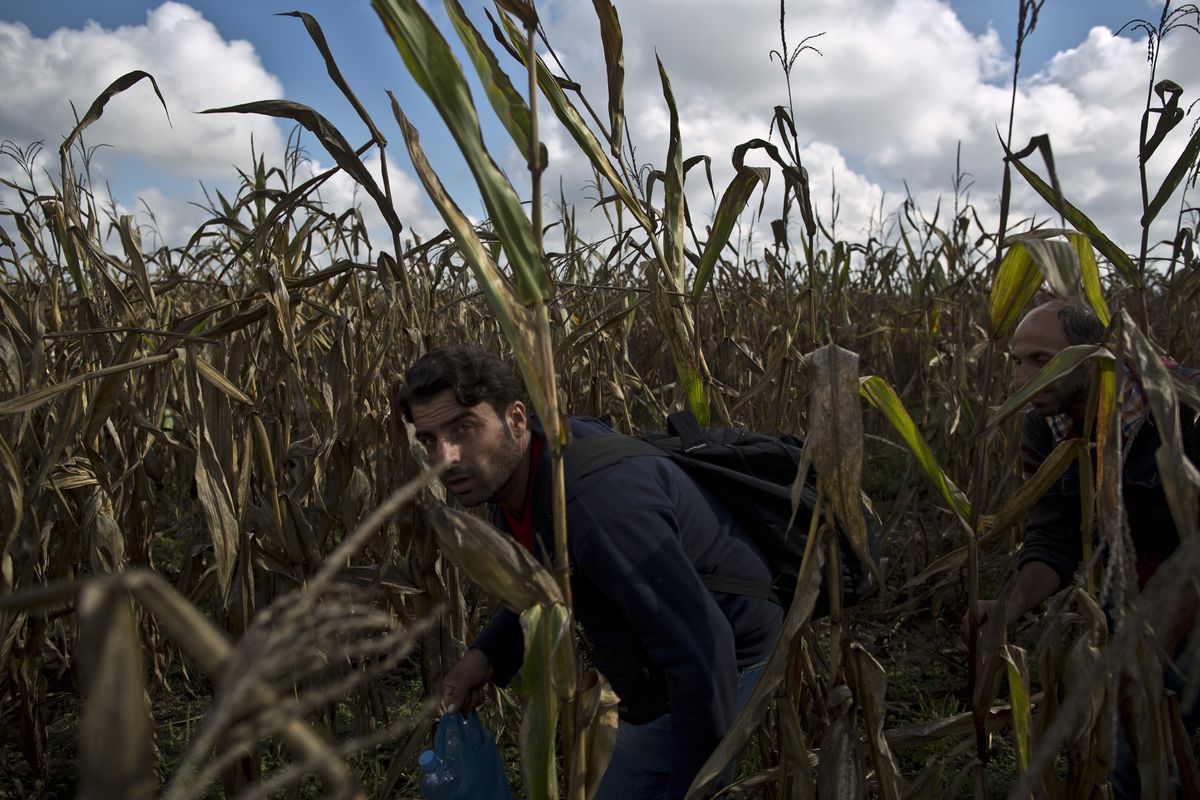Germany’s welcome to migrants stirs debate

BERLIN – Across Europe, and most particularly in Germany, the question resonates: Do humane policies toward desperate people who hope to start a new life in this prosperous country spur others to undertake the difficult and dangerous journey?
With asylum seekers flooding into Europe at a record pace, German Chancellor Angela Merkel on Saturday fended off fresh criticism from inside and outside her country over her government’s decision to essentially accept fleeing migrants and refugees first and ask questions later.
As the continent weathers its greatest immigration crisis since World War II, organizers of pro- and anti-migrant rallies across Europe sought to bring people into the streets to support or oppose a pan-European bid to secure at least temporary haven for hundreds of thousands of voyagers from Syria and other conflict-riven lands.
More vexing are questions of what to do about those who are merely seeking a better life, and have melded with the ongoing depopulation of Syria, together with those seizing an opportunity to flee war-torn countries like Afghanistan and Iraq, venues over the last decade and a half for U.S.-led wars with ambiguous outcomes. Germany and others have declared repeatedly that a desire for economic betterment alone will not secure long-term permission to stay.
Merkel declared Saturday that the decision to essentially throw open Germany’s border was in response to “an emergency situation.” A party allied with Merkel’s Christian Democrats, however, has questioned the long-term effects of receiving massive numbers of asylum seekers.
Horst Seehofer, the leader of the Christian Social Union – rooted in Germany’s Bavaria region, which has been ground zero for those entering from points south and east – said allowing in huge numbers of migrants and refugees afforded no chance to “put the cork back in the bottle.”
The weekly Der Spiegel quoted Seehofer, saying the move to let asylum seekers try to gain a foothold in Germany rather than registering in the country where they entered the European Union was an error “which will preoccupy us for an extended period.”
In a weekly video message, Merkel sought to emphasize that many of the arrivals, particularly women, had suffered extreme trauma before fleeing.
In the Bavarian capital of Munich, authorities were bracing for the arrival of 10,000 people Saturday, putting the flow on a par with the 20,000 migrants and refugees who came by bus or train last weekend from Austria via Hungary, after having made their way through Greece, Macedonia and Serbia.
Germany, the desired destination for many, has renewed its calls for European solidarity in the face of the crisis, while at the same time warning that it was “reaching limits” because of the swiftness of the onslaught.
Vice Chancellor Sigmar Gabriel, touring central Germany, said the sheer volume and speed of the refugee and migrant flow posed a greater difficulty than the overall numbers themselves. Germany has said it expects to receive at least 800,000 new arrivals this year, and quite possibly more.
In Germany and elsewhere, though, officials are increasingly looking – belatedly in the minds of many – to the root causes of mass flight. In a rare show of agreement, German and Hungarian officials called for steps to stem the numbers setting sail from Turkey – a short boat ride from gateway Greece – and for substantial increases in aid to Syria’s immediate neighbors, including Lebanon, Jordan and Turkey, which together shelter nearly 4 million Syrians.
Harsh criticism has been leveled at countries like Hungary, a way station on the trek to Germany that has made clear it has no desire to settle migrants and refugees.
Hungary in the coming week intends to seal off its border as best it can with a razor-wire fence, deploy troops if necessary to enforce a blockade and implement measures criminalizing passage through its territory to seek asylum elsewhere.
Right-wing Hungarian Prime Minister Viktor Orban has repeatedly blamed Germany for fostering the flood of humanity into Europe. Orban told Germany’s Bild tabloid that he would take in a refugee or migrant family – if not for the fact that others would “take that as an encouragement to come to Europe.”
As a custodian of the EU’s external borders on the so-called West Balkans route, which this summer has exploded in popularity as a means of reaching wealthy and welcoming refuges like Germany and Sweden, Hungary says it is being criticized unfairly for harsh anti-migrant measures.
Merkel’s government has taken in by far the largest share of the new arrivals: 450,000 people. But German diplomats have fallen short in efforts to get other countries, particularly poorer members of the former Soviet bloc, to step up.
In the Czech Republic capital of Prague, Germany’s foreign minister suffered a brisk rebuff from four eastern states that said migrants and refugees did not want to be placed there anyway. The European Union’s executive branch has thrown its weight behind a proposal to distribute 160,000 asylum seekers among the 28-nation bloc.
It is not only poor eastern neighbors of Germany that are opting out; Denmark, which is not legally obliged under EU rules to take in asylum seekers, also has declined.